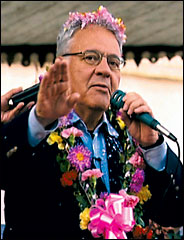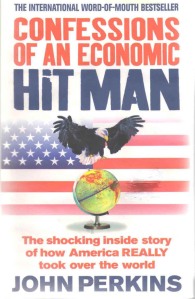Our Brand is Crisis
 Rachel Boynton’s Our Brand is Crisis is a documentary that follows the American consulting firm Greenberg, Carville and Strum as they strategize the Bolivian presidential campaign of Gonzolo Sanchez de Lozado, also known as Goni. Goni is running for president of Bolivia which is dealing with a devastating economic crisis. During the mid 1990’s Goni
Rachel Boynton’s Our Brand is Crisis is a documentary that follows the American consulting firm Greenberg, Carville and Strum as they strategize the Bolivian presidential campaign of Gonzolo Sanchez de Lozado, also known as Goni. Goni is running for president of Bolivia which is dealing with a devastating economic crisis. During the mid 1990’s Goni  had been the President of Bolivia. It was during his first term that Goni privatized Bolivia’s economy and created social security. But that was then, this time around Goni is very unpopular and it is GCS’s job to reinvent Goni as an appealing brand that will persuade voters to vote Goni as president. GCS will use US campaign tactics, such as savvy media ads, negative ads against his competitors. These tactics were to emphasize a simple and strong message that Goni is the best man for the job. And GCS believes that Goni will be able to solve Bolivia’s problems. Our Brand is Crisis shows how marketing can not only influence what people buy but also who they elect. As Jeremy Rosner, the firm’s main representative in Bolivia, puts it, GCS specializes in “progressive politics and foreign policy for profit…. We believe in a particular brand of democracy – market-based democracy.” But in the end GCS’s attempt to sell its brand of democracy looks more like an attempt to force American political homogeny on Bolivia and its people.
had been the President of Bolivia. It was during his first term that Goni privatized Bolivia’s economy and created social security. But that was then, this time around Goni is very unpopular and it is GCS’s job to reinvent Goni as an appealing brand that will persuade voters to vote Goni as president. GCS will use US campaign tactics, such as savvy media ads, negative ads against his competitors. These tactics were to emphasize a simple and strong message that Goni is the best man for the job. And GCS believes that Goni will be able to solve Bolivia’s problems. Our Brand is Crisis shows how marketing can not only influence what people buy but also who they elect. As Jeremy Rosner, the firm’s main representative in Bolivia, puts it, GCS specializes in “progressive politics and foreign policy for profit…. We believe in a particular brand of democracy – market-based democracy.” But in the end GCS’s attempt to sell its brand of democracy looks more like an attempt to force American political homogeny on Bolivia and its people.
James M. Cypher’s article The Slow Death of the Washington Consensus on Latin America discusses how the US Treasury, the International Monetary Fund and the World Bank along with key Latin American officials and businesses became the brains behind getting international corporations to use their influence to secure policy that would allow all areas of Latin American economies open to foreign investors. Within ten years the Latin American countries had not prospered as expected. Countries experienced increased poverty, falling wages, and an distorted distribution of  income. Chile would be the only Latin American country not to suffer under this neoliberal era. Mexico on the other hand did not fair as well. Mexico was in crisis which had occurred from the mismanagement of the Mexican peso and bad economic policies. Mexico was a country that suffered rising poverty, falling wages, deindustrialization and income inequality. This suffering would be viewed as “transition costs.” John Williamson believed that the Washington Consensus “should become like democracy and human rights, a part of the basic core of ideas that we hold in common and do not need to debate endlessly.” Ultimately Mexico would become “the best example of the consummate failure of the New Economic Model to sustain manufacturing exports throughout Latin America.”
income. Chile would be the only Latin American country not to suffer under this neoliberal era. Mexico on the other hand did not fair as well. Mexico was in crisis which had occurred from the mismanagement of the Mexican peso and bad economic policies. Mexico was a country that suffered rising poverty, falling wages, deindustrialization and income inequality. This suffering would be viewed as “transition costs.” John Williamson believed that the Washington Consensus “should become like democracy and human rights, a part of the basic core of ideas that we hold in common and do not need to debate endlessly.” Ultimately Mexico would become “the best example of the consummate failure of the New Economic Model to sustain manufacturing exports throughout Latin America.”
Bolivia did not want to be dependent on foreign investments. The desire for financial independence would be a major hurdle for Goni. Voters did not believe Goni would support Bolivia’s financial independence. That was demonstrated when the people rioted because of the issue of selling Bolivian gas to other countries. This riot led to an estimated 60 deaths.
How would a leader of a country even get foreign economic aid? John Perkins describes how he did it when working for a company called MAIN in Confessions of an Economic Hitman. Perkin’s job “was to encourage world leaders to become part of a vast network that promotes U.S. commercial interests. In the end, those leaders become ensnared in a web of debt that ensures their loyalty.” Once they have their loyalty they are able to use them to gratify any military, economic or political need. The countries in return would get power plants, industrial parks, and airports. However  the executives of these companies would then hire employees at slave wages to work under inhuman conditions. Perkins and other economic hitmen would work to bankrupt these countries making them indebted to their creditors, at the expense of the people.
the executives of these companies would then hire employees at slave wages to work under inhuman conditions. Perkins and other economic hitmen would work to bankrupt these countries making them indebted to their creditors, at the expense of the people.
Even though Rachel Boynton’s Our Brand is Crisis depicts how marketing can change public opinion, it also shows evidence of the United States desire to control and manipulate others for their own interests.
